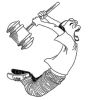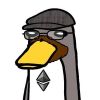9 Best-Selling Physical Cosmology Books Millions Love
Explore best-selling Physical Cosmology Books recommended by Pulitzer winner Anthony Doerr, science writer Alexandra Petri, and author John Scalzi




There's something special about books that both critics and crowds love, especially when they explore the vast mysteries of the universe. Physical Cosmology fascinates millions by tackling questions about the origins, structure, and fate of everything we know. These best-selling books have proven their worth by helping readers grasp complex cosmic theories with clarity and insight, making them valuable companions in your journey through the stars.
Pulitzer Prize-winning author Anthony Doerr praises Brian Clegg’s Before the Big Bang for its candid exploration of the universe’s origins, while Alexandra Petri, a columnist at The Washington Post, highlights Katie Mack’s The End of Everything for its witty and lucid prose on cosmic finales. Science fiction writer John Scalzi also recommends Mack’s work, appreciating how it explains the universe’s possible ends in an engaging way. Their endorsements reflect a blend of scientific rigor and accessible storytelling.
While these popular books provide proven frameworks, readers seeking content tailored to their specific Physical Cosmology needs might consider creating a personalized Physical Cosmology book that combines these validated approaches. This option lets you focus on the aspects of cosmology that matter most to you, matching your background and goals with expert insights.
Recommended by Anthony Wassano
Independent Ethereum educator and investor
“Recently read 'A Brief History of Time' by Stephen Hawking. The book is *dense* and introduces a lot of concepts that I had never heard of before but it was still an amazing read to get a nice understanding of cosmology and physics. Recommended read of course :)” (from X)
by Stephen Hawking··You?
by Stephen Hawking··You?
Drawing from his tenure as Lucasian Professor of Mathematics, Stephen Hawking unpacks some of the most puzzling questions about the universe in accessible language. You explore concepts like black holes, the flow of time, and the origins and possible fate of the cosmos, with chapters dedicated to phenomena such as quarks and antimatter. This book suits anyone curious about fundamental physics or cosmology, offering a solid introduction without requiring prior expertise. While it doesn’t shield you from complex ideas, it frames them in ways that invite reflection rather than confusion.
Recommended by Anthony Doerr
Pulitzer Prize-winning author
“Indeed, the existence of so many things, from dark matter to black holes to wormholes all has to be inferred. The Big Bang, too, is only provisional and seems to be waiting for a more graceful model to replace it. In Clegg’s words, the Big Bang theory “has the feeling of something held together with a Band-Aid. Whether what came before our universe was another universe or nothing, or something else yet unconsidered, for now the most accurate answer might be: We just don’t know.”
by Brian Clegg··You?
by Brian Clegg··You?
Brian Clegg, with a background in physics from Cambridge and experience in innovation consulting, offers a thoughtful exploration of the question that captivates many: what existed before the Big Bang? You’ll trace the evolution of cosmological ideas from ancient myths to modern scientific debates, gaining insight into the theories that challenge or support the Big Bang model. Clegg doesn’t just recount facts—he invites you to consider the philosophical implications of the universe’s origins, particularly in chapters examining black holes and cyclical universes. This book suits anyone curious about cosmology’s foundational questions and the ongoing quest to understand our cosmic beginnings.
by TailoredRead AI·
This tailored book explores the foundational topics of physical cosmology with a focus on your interests and background. It examines key concepts such as the Big Bang, cosmic inflation, dark matter, and spacetime dynamics, combining widely validated knowledge with insights tailored to your learning goals. By concentrating on the areas you find most engaging, this book offers a clear and personalized pathway through complex cosmological ideas. Its approach connects the most relevant discoveries and theories in a way that matches your experience level and curiosity, making the profound mysteries of the universe accessible and compelling.
Recommended by The Washington Post
“[Hawking is] a symbol of the soaring power of the human mind.”
by Stephen Hawking··You?
by Stephen Hawking··You?
Drawing from his decades as Lucasian Professor of Mathematics, Stephen Hawking offers concise reflections on some of humanity's most profound questions, from the survival of our species to the existence of God. You’ll gain insight into the interplay between cutting-edge physics and urgent global challenges like climate change and artificial intelligence. Hawking’s ability to distill complex cosmological concepts into accessible explanations shines through chapters that address the universe's origins and our place within it. This book suits you if you want a thoughtful, approachable exploration of physical cosmology intertwined with philosophical and practical concerns.
Drawing from a particle physicist's perspective, D. Bailin explores the intersection of gauge field theory and string theory within the framework of cosmology. You’ll find detailed examinations of phase transitions after the big bang, including relic particles like axions and neutrinos, and how supersymmetric and supergravity theories shape our understanding of the universe’s inflationary era. The book also tackles the microscopic origins of black hole entropy through string theory insights, making it especially useful if you’re navigating graduate-level physics or seeking to deepen your grasp of cosmological models tied to fundamental particle physics. This isn’t a casual read but one that rewards you with a nuanced view of the universe’s earliest moments and theoretical underpinnings.
by P. J. E. Peebles··You?
by P. J. E. Peebles··You?
Drawing from his distinguished career as a Nobel Prize–winning physicist, P.J.E. Peebles developed this book to bridge observational breakthroughs with theoretical physics in cosmology. You’ll explore how modern astrophysical observations, from ground and space, have reshaped our understanding of the universe’s origin, structure, and evolution since the hot big bang. Chapters guide you through the expanding universe’s discovery, tests of spacetime geometry grounded in general relativity, and the formation of galaxies and large-scale structures. This book suits advanced students and scientists beyond cosmology seeking a thorough, physics-based view of the universe’s fabric and history.
by TailoredRead AI·
This tailored book explores the key principles of physical cosmology through a focused, step-by-step plan designed to match your background and interests. It examines the fundamental concepts shaping our universe, from the big bang to cosmic evolution, offering a personalized journey that connects popular scientific knowledge with your specific goals. The content reveals complex ideas in digestible segments, helping you rapidly grasp essential theories and phenomena. By addressing the aspects most relevant to you, this tailored guide makes learning cosmology both accessible and engaging, allowing you to deepen your understanding efficiently while following a path suited to your pace and curiosity.
Recommended by John Scalzi
Author and science fiction writer
“Weird science, explained beautifully.”
by Katie Mack··You?
by Katie Mack··You?
When Katie Mack first learned that the universe might end abruptly, she was captivated by the profound implications, leading her to a career in theoretical astrophysics. In this book, you navigate five distinct cosmic finales—from the Big Crunch to Vacuum Decay—each revealing key concepts in cosmology, quantum mechanics, and string theory. Mack’s engaging style breaks down complex ideas with humor and clarity, such as her vivid explanation of heat death in chapter three. If you’re curious about the ultimate fate of the cosmos and want a scientifically rich yet approachable guide, this book offers a thoughtful exploration without overwhelming jargon.
by A.K. Raychaudhuri·You?
by A.K. Raychaudhuri·You?
What if everything you knew about the universe's structure was re-examined through rigorous theoretical frameworks? A.K. Raychaudhuri, a physicist deeply rooted in mathematical physics, presents an exploration into cosmology that moves beyond observational data to the fundamental equations shaping our understanding of the cosmos. You’ll engage with complex concepts like spacetime dynamics and gravitational fields, gaining insights into how theoretical models predict cosmic evolution. This book suits those comfortable with advanced physics who want to deepen their grasp of the universe’s underlying principles rather than casual observers of astronomy.
by John F. Hawley, Katherine A. Holcomb·You?
by John F. Hawley, Katherine A. Holcomb·You?
John F. Hawley and Katherine A. Holcomb leverage their extensive backgrounds in astronomy and physics to unpack the evolving landscape of cosmology shaped by satellite data like that from the Hubble Space Telescope. You’ll gain a solid grasp of the fundamental physics underlying cosmological theories, including relativity and the Big Bang, alongside current debates on dark energy and the universe's fate. Chapters delve into the historical context, detailed models like the concordance model, and contemporary research areas such as quantum cosmology, providing you with a comprehensive yet accessible foundation in modern physical cosmology. This book suits anyone serious about understanding the scientific framework and observational evidence shaping today’s cosmological insights.
by Viatcheslav Mukhanov··You?
by Viatcheslav Mukhanov··You?
What if everything you knew about the early universe was reconsidered? Viatcheslav Mukhanov, a professor of physics with deep expertise in cosmology, developed this textbook to address critical gaps in the traditional hot big bang model. You’ll gain a thorough understanding of inflationary cosmology, exploring both the universe’s homogeneous structure and the origins of its inhomogeneities. The detailed treatment of quantum cosmological perturbations and inflation theory equips you with the conceptual tools to grasp how the universe’s large-scale structure emerges. This book suits anyone ready to tackle the theoretical foundations of physical cosmology, especially graduate students and researchers seeking a rigorous approach.
Proven Cosmology Methods, Personalized ✨
Get expert-backed Physical Cosmology insights tailored to your goals and background.
Trusted by thousands of Physical Cosmology enthusiasts worldwide
Conclusion
These nine books collectively reveal three clear themes: a foundation in the fundamental principles of cosmology, a thoughtful engagement with the universe’s origins and fate, and a balance between theoretical rigor and approachable explanation. If you prefer proven methods grounded in foundational physics, start with Stephen Hawking’s A Brief History of Time and P.J.E. Peebles’ Principles of Physical Cosmology. For validated, current perspectives, combine Brian Clegg’s Before the Big Bang with Katie Mack’s The End of Everything.
For those ready to deepen their understanding with mathematically rigorous treatments, Physical Foundations of Cosmology by Viatcheslav Mukhanov and Theoretical Cosmology by A.K. Raychaudhuri offer challenging yet rewarding insights. Alternatively, you can create a personalized Physical Cosmology book to combine proven methods with your unique needs.
These widely-adopted approaches have helped many readers succeed in grasping the cosmos. Whether you’re starting out or advancing your expertise, these best-selling books offer reliable paths to deepen your understanding of the universe’s grand story.
Frequently Asked Questions
I'm overwhelmed by choice – which book should I start with?
Start with Stephen Hawking’s A Brief History of Time for a solid foundation. It introduces key cosmological concepts in accessible language, making complex ideas easier to grasp before moving to more advanced texts.
Are these books too advanced for someone new to Physical Cosmology?
Not at all. Titles like Cosmology: A Very Short Introduction and Brief Answers to the Big Questions offer clear overviews suitable for beginners, while others like Principles of Physical Cosmology cater to more experienced readers.
What's the best order to read these books?
Begin with accessible overviews such as Hawking’s and Coles’s works, then explore thematic books like Before the Big Bang and The End of Everything. Advanced readers can tackle Peebles and Mukhanov last for depth.
Do I really need to read all of these, or can I just pick one?
You can pick based on your interests. For origins, try Before the Big Bang; for universe fate, The End of Everything; for theory, Principles of Physical Cosmology. Each offers distinct insights.
Are any of these books outdated given how fast Physical Cosmology changes?
While cosmology evolves, many core principles discussed in these books remain relevant. Some provide recent perspectives, like Katie Mack’s 2020 book, ensuring a blend of foundational and up-to-date content.
Can personalized Physical Cosmology books complement these expert picks?
Yes! Personalized books combine proven expert insights with your unique learning goals, focusing on specific topics you care about. They’re a great way to deepen your knowledge efficiently. Check out personalized Physical Cosmology books to learn more.
📚 Love this book list?
Help fellow book lovers discover great books, share this curated list with others!
Related Articles You May Like
Explore more curated book recommendations








